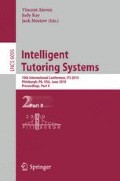Abstract
Although, many have theorized about the link between cognition and affect and its potential importance in complex tasks such as problem solving and deep learning, this link has seldom been explicitly investigated during tutoring. Consequently, this paper investigates the relationship between learners’ cognitive and affective states during 50 tutoring sessions with expert human tutors. Association rule mining analyses revealed significant co-occurrence relationships between several of the cognitive measures (i.e., student answer types, question types, misconceptions, and metacomments) and the affective states of confusion, frustration, and anxiety, but not happiness. We also derived a number of association rules (Cognitive State → Affective State) from the co-occurrence relationships. We discuss the implications of our findings for theories that link affect and cognition during learning and for the development of affect-sensitive ITSs.
Access this chapter
Tax calculation will be finalised at checkout
Purchases are for personal use only
Preview
Unable to display preview. Download preview PDF.
References
Damasio, A.: Descarte’s Error: Emotion, Reason, and the Human Brain. Gosset/Putnam, New York (1994)
Bower, G.H.: Emotional Mood and Memory. American Psychologist 36, 129–148 (1981)
Dagleish, T., Power, M.J.: Handbook of Cognition and Emotion. Wiley, Chichester (1999)
Lazarus, R.S.: The Cognition-Emotion Debate: A Bit of History. In: Dagleish, T., Power, M.J. (eds.) Handbook of Cognition and Emotion, pp. 3–19. Wiley, Chichester (1999)
Mandler, G.: Mind and Body: Psychology of Emotion and Stress. Norton, New York (1984)
Barrett, L.F., Mesquita, B., Ochsner, K.N., Gross, J.J.: The Experience of Emotion. Annual Reviews 58, 373–403 (2007)
Ortony, A., Clore, G.L., Collines, A.: The Cognitive Structure of Emotions. Cambridge University Press, Cambridge (1988)
Scherer, K.R., Schorr, A., Johnstone, T.: Appraisal Proceses in Emotion: Theory, Methods, Research. Oxford University Press, New York (2001)
Stein, N.L., Levine, J.L.: Making Sense Out of Emotion: The Representation and Use of Goal-Structured Knowledge. In: Kessen, W., Ortony, A., Craik, F. (eds.) Memories, Thoughts, and Emotions: Essays in Honor of George Mandler, pp. 295–322. Lawrence Erlbaum Associates, Inc., England (1991)
Bjork, R.A., Linn, M.C.: The Science of Learning and The Learning of Science: Introducing Desirable Difficulties. APS Observer 19, 29 (2006)
Festinger, L.: A Theory of Cognitive Dissonance. Row Peterson, Evanston (1957)
Graesser, A.C., Lu, S., Olde, B.A., Cooper-Pye, E., Whitten, S.: Question Asking and Eye Tracking during Cognitive Disequilibrium: Comprehending Illustrated Texts on Devices When The Devices Breakdown. Memory & Cognition 33(7), 1235–1247 (2005)
Piaget, J.: The Origins of Intelligence in Children. Basic Books, New York (1952)
VanLehn, K., Siler, S., Murray, C., Yamauchi, T., Baggett, W.B.: Why Do Only Some Events Cause Learning During Human Tutoring? Cognition and Instruction 21(3), 209–249 (2003)
Spielberger, C.D., Goodstein, L.D., Dahlstrom, W.G.: Complex Incidental Learning as a Function of Anxiety and Task Difficulty. J. of Experimental Psychology 56(1), 58–61 (1958)
Fielder, K.: Affective States Trigger Processes of Assimilation and Accommodation. In: Martin, L., Clore, G. (eds.) Theories of Mood and Cognition: A User’s Guidebook, pp. 85–98. Erlbaum, Mahwah (2001)
Isen, A.: An Influence of Positive Affect on Decision Making in Complex Situations: Theoretical Issues with Practical Implications. J. of Consumer Psychology 11, 75–85 (2001)
Hertel, G., Neuhof, J., Theuer, T., Kerr, N.: Mood Effect on Cooperation in Small Groups: Does Positive Mood Simply Lead to More Cooperation? Cognition and Emotion 14, 441–472 (2000)
Schwarz, N., Skurnik, I.: Feeling and Thinking: Implications for Problem Solving. In: Davidson, J., Sternberg, R. (eds.) The Psychology of Problem Solving, pp. 263–290. Cambridge University Press, New York (2003)
Person, N., Lerhman, B., Ozbun, R.: Pedagogical and Motivational Dialogue Moves Used by Expert Tutors. In: Presented at the 17th Annual Meeting of the Society for Text and Discourse, Glasgow, Scotland (2007)
D’Mello, S.K., Craig, S.D., Fike, K., Graesser, A.C.: Responding to Learner’s Cognitive-Affective States with Supportive and Shakeup Dialogues. In: Jacko, J.A. (ed.) Human Computer Interaction; Ambient, Ubiquitous and Intelligent Interaction, pp. 595–604. Springer, Heidelberg (2009)
Conati, C., Maclaren, H.: Empirically Building and Evaluating a Probabilistic Model of User Affect. User Modeling and User-Adapted Interaction 19(3), 267–303 (2009)
Arroyo, I., Woolf, B., Cooper, D., Burleson, W., Muldner, K., Christopherson, R.: Emotion Sensors Go to School. In: Dimitrova, V., Mizoguchi, R., du Boulay, B., Graesser, A. (eds.) Proceedings of 14th International Conference on Artificial Intelligence in Education, IOS Press, Amsterdam (2009)
D’Mello, S.K., Person, N., Lehman, B.A.: Antecedent-Consequent Relationships and Cyclical Patterns between Affective States and Problem Solving Outcomes. In: Dimitrova, V., Mizoguchi, R., du Boulay, B., Graesser, A. (eds.) Proceedings of 14th International Conference on Artificial Intelligence in Education, pp. 57–64. IOS Press, Amsterdam (2009)
Litman, D., Forbes-Riley, K.: Recognizing Student Emotions and Attitudes on the Basis of Utterances in Spoken Tutoring Dialogues with Both Human and Computer Tutors. Speech Communication 48(5), 559–590 (2006)
Lehman, B., Matthews, M., D’Mello, S., Person, N.: What Are You Feeling? Investigating Student Affective States during Expert Human Tutoring Sessions. In: Woolf, B.P., Aïmeur, E., Nkambou, R., Lajoie, S. (eds.) ITS 2008. LNCS, vol. 5091, pp. 50–59. Springer, Heidelberg (2008)
Agrawal, R., Srikant, R.: Fast Algorithms for Mining Association Rules in Large Databases. In: Proceedings of the VDLB Conferences, Santiago, Chile (1994)
Cohen, J.: A Power Primer. Psychological Bulletin 112(1), 155–159 (1992)
Bloom, B.S.: The 2 Sigma Problem: The Search for Methods of Group Instruction as Effective as One-to-One Tutoring. Educational Researcher 13, 4–16 (1984)
Lepper, M.R., Woolverton, M.: The Wisdom of Practice: Lessons Learned from Highly Effective Tutors. In: Aronson, J. (ed.) Improving Academic Achievement: Impact of Psychological Factors on Education, pp. 135–158. Academic Press, San Diego (2002)
Author information
Authors and Affiliations
Editor information
Editors and Affiliations
Rights and permissions
Copyright information
© 2010 Springer-Verlag Berlin Heidelberg
About this paper
Cite this paper
Lehman, B., D’Mello, S., Person, N. (2010). The Intricate Dance between Cognition and Emotion during Expert Tutoring. In: Aleven, V., Kay, J., Mostow, J. (eds) Intelligent Tutoring Systems. ITS 2010. Lecture Notes in Computer Science, vol 6095. Springer, Berlin, Heidelberg. https://doi.org/10.1007/978-3-642-13437-1_1
Download citation
DOI: https://doi.org/10.1007/978-3-642-13437-1_1
Publisher Name: Springer, Berlin, Heidelberg
Print ISBN: 978-3-642-13436-4
Online ISBN: 978-3-642-13437-1
eBook Packages: Computer ScienceComputer Science (R0)

